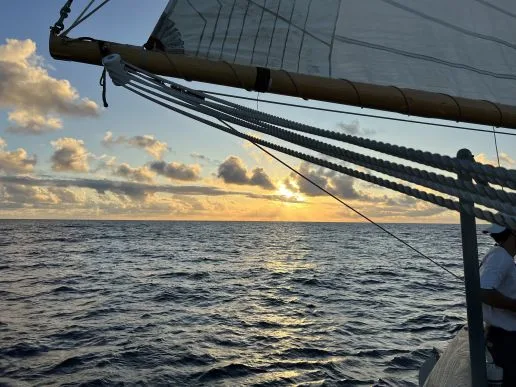Programs Blog
What a big day (she thinks every day)!

April 19, 2023
Franny Lux, A Watch, University of New Hampshire
Ship’s Log
Noon Position
03°22.525’S 143°36.11’W
Ship Heading
325°
Ship Speed
5.6 knots
Taffrail Log
1351 nautical miles
Weather / Wind / Sail Plan
Motor sailing under the staysl’s. Winds ExS force 3. Seas NE at 3 feet
Description of location
Getting close to the equator!
There are so many different things to get used to when you go from your normal life on land to living with 31 other people aboard a 134 foot sailing ship in the middle of the Pacific. There’s the lack of cell service, the constant motion, the constant beautiful views, the heat, and so much more that makes this time different from our normal lives. For me, one of the biggest adjustments has been trying to wrap my head around the way that I experience time aboard the ship. Sure, time in the most basic sense is the same, an hour is still an hour and all that, but in almost every other sense, time is totally different out here.In my reflections on this experience so far, time comes together as a common theme. In a simple sense, our days here are shorter than on land. With our watch schedule of six hours on watch, twelve hours off watch, if you (like I do) were to think of each watch being in a different day, you’d be shortening your idea of a day to 18 hours. I didn’t realize I was doing this until class yesterday when the watch giving our navigation report mentioned that it had only been three days since we left Nuka Hiva and really set sail.I couldn’t believe only three days has passed, which made me realize that I’d been thinking of days as being one watch cycle. The more I think about time here the more meaning it loses. Even though a “day” here is so much shorter than a day at home, they’re so full of fun and learning.Today’s a good example of this. A watch had afternoon watch yesterday, so we got to sleep through the night last night. We got our wakeups at 0600, had a fantastic breakfast of French toast (thanks stu-stew Cate and steward Raechel!), then headed up to deck for our watch to begin at 0700. I did some plotting and weather observations for the first hour, then headed down to the engine room to help engineers Marshall and Beth for the second hour. After helping to trouble shoot a pump and transfer fuel I headed back to deck to relieve the lookout. Time seemed to slow down a bit while I kept an eye on the clouds (and tried not to get too sunburnt) and team science deployed the CTD Rosette (whoohoo!). After I was relieved from lookout I spent some time calculating when LAN (local apparent noon) would occur with mate-in-training Danny and got ready to use a sextant to attempt to figure out where we are based on the sun. I then headed down to the galley to help with dishes for the last bit of the watch. Big day! – and it was only lunch time. Every watch feels just as action packed, whether it’s a morning on deck steering and playing with the sails or the middle of the night running water samples and ID-ing organisms in lab.So far the afternoon has felt a lot slower than the morning. After lunch I spent some time hanging out with C watch, who we’re usually not awake at the same time as (more time weirdness!!), then helped steward Tobi and stu-stew Cate make some delicious baked goods for snack. Now, I’m writing this, drinking some tea, and pondering if I have time for a pre-dinner nap to get a head start on sleep before dawn watch. I’m trying to learn to take naps on this trip, something I feel like I never have time for on land.It’s still crazy to me to be living a schedule where time is so different from what I’m used to on land. I’m sure it’ll feel just as crazy to go back to a more “normal” relationship with time once the trip ends and I’ve gotten so used to the watch schedule. But, in the meantime, I’m going to say “big day” whenever I head to my bunk, keep working on developing that love of naps, and try to soak up every minute out here, however short or long it may feel.Hi everyone at home! Miss you all.Franny Lux, A Watch, University of New Hampshire
https://sea.edu/wp-content/uploads/2023/04/blog-photo-1-april-19_small-1.jpg
Recent Posts from the Ships
- Ocean Classroom 2024-A collaborative high school program with Proctor Academy
- Collaborations and Long-term Commitments: SEA’s Caribbean Reef Program Sets a Course for Coastal Programs that Compliment Shipboard Experiences.
- Sea Education Association students prepare for life underway using state of the art nautical simulation from Wartsila Corporation.
- SEA Writer 2022, Magazines From the Summer SEA Quest Students
- Technology@SEA: Upgrades Allow Insight into Ocean Depths
Programs
- Gap Year
- Ocean Exploration
- High School
- Science at SEA
- SEA Expedition
- SEAScape
- Pre-College
- Proctor Ocean Classroom
- Protecting the Phoenix Islands
- SPICE
- Stanford@SEA
- Undergraduate
- Climate and Society
- Climate Change and Coastal Resilience
- Coral Reef Conservation
- Marine Biodiversity and Conservation
- MBL
- Ocean Exploration: Plastics
- Ocean Policy: Marine Protected Areas
- Oceans and Climate
- Pacific Reef Expedition
- The Global Ocean: Hawai'i
- The Global Ocean: New Zealand